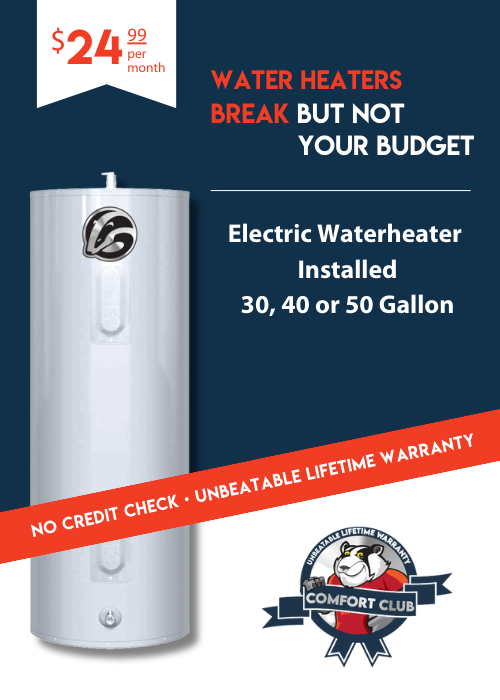Water Heater Specials
From The Experts at Badger Bob's Services
Conventional
Water Heater Special
Get a New Hot Water Heater Same Day for just $24.99/mo.
Our expert plumbers install 30, 40 to 50 gallon Gas or Electric tank water heaters the same day. Replacing your water heater has never been so affordable, and our Comfort as a Service program includes free lifetime repairs for our conventional gas and electric water heaters too.
It's important to choose a trusted professional when replacing your water heater. At Badger Bob's Services, our plumbing team has the highest ratings in the area, and our skilled plumbers can install your water heater on the same day.
Take advantage of our in-house financing!
Celebrating 40 years serving greater Sarasota homeowners & businesses
For any questions, give us a call at 941-225-2775. Or, if you prefer, you can easily schedule a free in-home consultation online by clicking the button below.

Request more information
Call 941-225-2775 or complete the form
Please complete the form below and our plumbing team will respond promptly. If you can't find the water heater you're looking for, don't worry! We can special order and install a wide range of sizes and brands. We also offer multiple financing options so you can choose the one that's right for you.
Get a free in-home estimate
For your new water heater today
Get the best deals on water heaters with Badger Bob's Services
At Badger Bob's Services, we offer a wide range of water heater brands and models at competitive prices. Whether you prefer a high-efficiency tankless unit or a cost-effective conventional tank option, our knowledgeable plumbers will help you find the perfect water heater to meet your needs and budget.
Take advantage of our free in-home estimate and let Badger Bob's Services provide you with a seamless and stress-free water heater installation experience. Contact us today to get started.

Water heater tips
From the Badger
No Hot Water? Here’s What to Do
When a homeowner suddenly discovers they have no hot water in their home, it can be quite an inconvenience. There are several steps they can take to identify the issue and potentially fix it themselves. However, it's crucial to exercise caution and follow safety guidelines when troubleshooting and performing any DIY fixes on a water heater.
First, the homeowner should check the circuit breaker or fuse box to ensure the water heater has power. If the breaker has tripped, simply reset it; if the fuse has blown, replace it with a new one. If the problem persists after restoring power, it's time to investigate further.
Next, inspect the water heater's thermostat settings. In some cases, the thermostat may have been accidentally adjusted or malfunctioned, resulting in a lack of hot water. Ensure the thermostat is set to a suitable temperature, typically between 120-140°F (48-60°C). If the thermostat is nonfunctional, it may need to be replaced.
For gas water heaters, verify that the pilot light is lit. If it isn't, follow the manufacturer's instructions to relight it. If the pilot light won't stay lit, there could be an issue with the thermocouple, which may require professional assistance.
Homeowners can also check for leaks around the water heater, especially near the pressure relief valve or the tank itself. A leaking tank may indicate that the water heater has reached the end of its life and needs to be replaced. If the pressure relief valve is leaking, try gently lifting the valve to release excess pressure and reseating it. If the problem persists, a replacement valve may be necessary.
To prevent water heater issues in the future, homeowners should conduct regular maintenance. This includes:
- Draining and flushing the tank at least once a year to remove sediment buildup, which can reduce efficiency and lead to premature failure.
- Inspecting and replacing the anode rod every few years, as it helps prevent corrosion within the tank.
- Keeping the area around the water heater clean and free of debris to ensure proper airflow and reduce fire hazards.
- Checking the pressure relief valve annually to ensure it's working correctly and not leaking.
- Monitoring the water heater for any unusual noises or changes in performance, as these can be early warning signs of potential problems.
If a homeowner has exhausted all DIY troubleshooting steps and the issue persists, it's time to call a professional plumber for further inspection and repair. While some issues can be fixed with simple DIY methods, water heater repairs can be complex and dangerous if not handled correctly. Consulting a professional can save time, money, and ensure the safety of the homeowner and their property.
Tank vs. Tankless Water Heaters
Tank and tankless water heaters differ significantly in their design, operation, and functionality, offering unique advantages and disadvantages to homeowners.
Tank water heaters store and heat a large volume of water in an insulated tank, typically ranging from 30 to 80 gallons. The water is heated continuously or periodically, maintaining a consistent temperature for use whenever needed. Tank water heaters can be powered by electricity, natural gas, propane, or oil. They tend to be more affordable upfront and are relatively easy to install. However, they have a lower energy efficiency compared to tankless models, as heat is lost through standby energy losses. Additionally, once the stored hot water is depleted, it takes time to reheat the tank, leading to potential periods of insufficient hot water supply.
Tankless water heaters, also known as on-demand or instantaneous water heaters, heat water only when it's needed, eliminating the need for a storage tank. When a hot water tap is turned on, cold water travels through a pipe and is heated by either an electric element or gas burner, delivering a continuous supply of hot water. Tankless water heaters are generally more energy-efficient, as they avoid standby heat losses associated with tank models. They also have a longer lifespan, often lasting up to 20 years or more. However, they typically have a higher upfront cost and can be more complex to install, sometimes requiring additional upgrades such as gas line or venting modifications.
In summary, tank water heaters are more affordable and easier to install but have lower energy efficiency and limited hot water supply. In contrast, tankless water heaters offer continuous hot water and higher energy efficiency but come with a higher initial cost and may require more complex installation. The choice between the two depends on the homeowner's needs, budget, and long-term energy efficiency goals.










